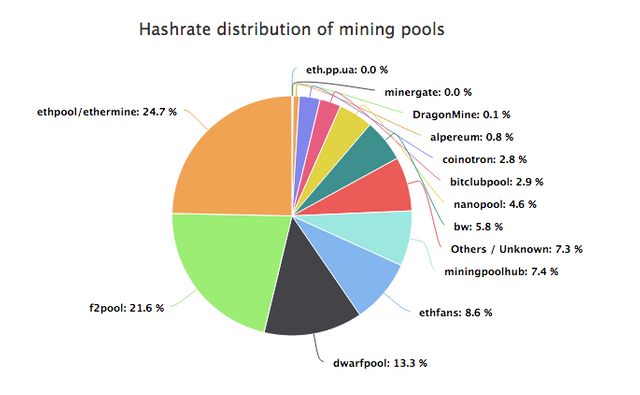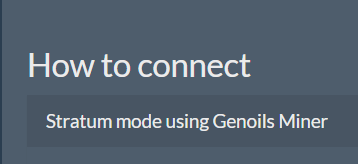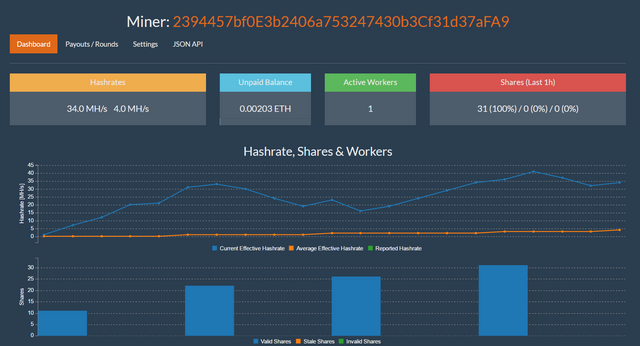Miner's Log - Day 01
Miner's Log - Day 01
Crypto Wars Episode IV - A New Hash
So today I decided I would try my hand - er - hardware at doing some Ethereum mining. I've invested some solid cash into my desktop for PC gaming, including a GTX 1070 Founders Edition, but lately I've spent much more time crushing project code bugs than crushing my enemies in Civ VI. So I figured why let powerful hardware sit idle when it could be making me money improving the Ethereum network?
Investigating Hash Pools
Frankly, my research wasn't exactly terribly in-depth. I Googled some generic query like "best eth mining pools" and got promising some results. One of the top three links had this super convenient info-graphic:
Which pretty clearly reveals a hash-market dominance from ethermine.org. So I had some hardware and a pool to join, how do I actually start hashing - and more importantly - how do I get paid for it?
Getting A Wallet
You're not going to be seeing much in the way of dividends unless you've got somewhere to receive all this sweet cryto-dough. If you haven't already set up a wallet to store ERC20 (Ethereum-based) tokens, I'd suggest heading over to my friend tomshwom's guide (It's not available at time of writing, but I'll comment it when it's posted) and doing that ASAP. While we wait for his guide to be posted, I use MyEtherWallet to keep my coins in cold storage. You can find detailed instructions for them either on their website, or through some trivial Google searching. You really shouldn't be storing your coins - ERC20 or otherwise - on exchanges. They're vulnerable to a multitude of attacks that can at best leave you with massive delays, and at worst leave you locked out of your account, or even have your coins stolen altogether.
Start Hashing
Fortunately for me, ethermine thought ahead and included a super simple set of guides to get started ASAP. Your mileage will vary with this, but I went with the top guide found on their home page (link above), titled
I followed their instructions to the T and, lo and behold, I was mining within 5 minutes. My final BASH script (I'm running Windows 10) looked like this
setx GPU_FORCE_64BIT_PTR 0
setx GPU_MAX_HEAP_SIZE 100
setx GPU_USE_SYNC_OBJECTS 1
setx GPU_MAX_ALLOC_PERCENT 100
setx GPU_SINGLE_ALLOC_PERCENT 100
ethminer.exe --farm-recheck 200 -G -S us1.ethermine.org:4444 -FS us2.ethermine.org:4444 -O 0x2394457bf0E3b2406a753247430b3Cf31d37aFA9.mjolnir
NOTE THE FOLLOWING:
- You MUST enter your own ETH wallet address after the
-Oflag. Mine is seen here as0x2394457bf0E3b2406a753247430b3Cf31d37aFA9followed by.mjolnirbecause that's what I call my desktop. The.mjolnirportion can be whatever you want it to be, it's for you to identify what rig is doing what in the event that you have multiple rigs and want to see their individual performance. - You SHOULD enter the appropriate servers after the
-Sand-FSflags. These are your Primary Server and Fail-safe Server for reporting your hashes to. I'm on the East Coast of the United States, so the closest two servers to me are North America servers. You'll want to make your Fail-safe Server different from the Primary Server (even different from the second option) so that if your Primary Server connection is severed for any reason you can possibly still reach the Fail-safe Server and keep getting rewarded for your work. There is a list of them in the guide but I'll repeat them here as well:- North America (East): us1.ethermine.org:4444 or us1.ethermine.org:14444
- North America (West): us2.ethermine.org:4444 or us2.ethermine.org:14444
- Europe (France): eu1.ethermine.org:4444 or eu1.ethermine.org:14444
- Europe (Germany): eu2.ethermine.org:4444 or eu2.ethermine.org:14444
- Asia: asia1.ethermine.org:4444 or asia1.ethermine.org:14444
Initial Results
Returning to ethermine.org and entering the your ETH wallet address in their (far too small) search-bar at the top of the page will take you to a page where you can see your rig's performance.
I've let my rig run for about three hours now and I'm already seeing some returns, which is honestly better than I thought. After some quick calculations, I've got a FAR higher predicted payout than I was expecting, enough that even after today's poorly-timed difficulty bomb I may consider buying a second card to:
- Mine more ETH while I'm asleep and at class
- Compute all of my Nvidia PHYS-X calculations for games than have that ability
Going Forward
As you can see above, my average hash rate (orange line in the graph) is slowly increasing from 0H/s to I would guess ~30MH/s. It'll take at least 24 hours to see a true average, but I'm curious to see where it lands. My local command-line is reporting ~25MH/s, but ethermine says that their values may not line up with local reports, and that theirs are more accurate. Either way, they think I'm doing more work than my PC thinks it's doing, so I'm ok with their numbers!
I'm also waiting for my first payout. The lowest possible denomination you can cash out at is 0.05 ETH, but anything below 1 ETH will incur a 0.01 ETH transaction (or tx for short) fee. I'm currently set at the default 1 ETH, and eagerly waiting for my balance to reach that so I can actually be paid for my PC's diligent work.


Good stuff. You might want to look into Claymore's mining software though, it's significantly better and allows for things like dual mining where you can do Ethereum and Decred/Siacoin/Lbry/Pascal mining at the same time with no performance hit to Ethereum.
Also, even though f2pool is big, I would never recommend mining for them since they have a long history of abusing their hash power in the Bitcoin blockchain to decide whether or not certain forks / upgrades can happen. They have said that they will not support hard-forks, even in Ethereum, "irrespective of the team proposing", if they find it to be controversial or rushed. They have a clear incentive to oppose future improvements to Ethereum like the PoS model.